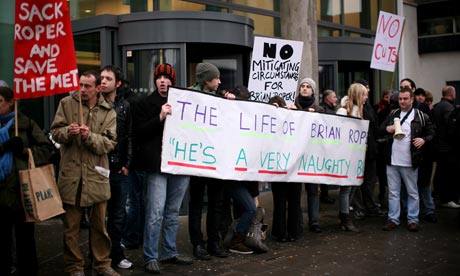

Students protest over funding cuts for arts education at London Metropolitan University. Photograph: Graeme Robertson for the Guardian
Thousands of students from all over the country will be marching through London this Wednesday against the government's plans for universities. The government's white paper for higher education calls itself "Students at the heart of the system". As the president of the students' union at London Metropolitan University, I have been on the frontline facing the attacks against students and education. I know how contradictory this title is, and how vital it is that we stand up and fight for the opportunities that have been won over generations.
The higher education white paper is in fact an attempt to turn the learning environment into a marketplace and learners into customers. "Profit at the heart of the system" would be far more accurate. The government seeks to justify cuts and fee increases in higher education by saying that students are a burden on the taxpayer – but the new funding regime will actually require students to borrow more money from the taxpayer at a time of economic crisis. Is this a logical move or an ideological one?
Allowing private companies to take over public resources has historically had an adverse affect on our communities. This year energy companies have made record profits by raising prices through the roof, leaving vulnerable people to suffer the cold – and in extreme case die – because they cannot afford their heating bills. The privatisation of education and healthcare is like selling off our children to the highest bidder.
London Met has a diverse student body. Many of our students come from widening participation backgrounds, with high proportions of working class and black and ethnic-minority students. The very ethos of London Met is to enable students who would not previously had the chance to enter into higher education the opportunity to have the same life choices that were previously only provided for a privileged few.
We now face the worst cuts out of any university in Britain. These include a 70% cut to the undergraduate course portfolio, which has resulted in the loss of subjects such as philosophy, history and performing arts. These courses were financially viable, had high student satisfaction and retention, and some scored higher in the league tables than any other course at London Met. To cut these courses was not logical. This was a move to vocationalise the course offering.
The rationale behind such a move is highly flawed, as there is no data to suggest that students who leave London Met go into employment in the field of which they studied. In fact, the data collected for the Destinations of Leavers from Higher Education survey shows that the faculty of computing, which is made up of vocational courses, has the lowest graduate employment rating.
The result of offering mainly vocational courses at institutions like London Met is that the majority of working-class and black and ethnic-minority students who enter into higher education will have their choices limited to what is deemed to be of value by the decision-makers at the institution. This will limit social mobility and is a step backwards for post-1992 universities. Meanwhile, at Russell Group institutions, the sons and daughters of Middle England will be allowed to continue to study arts and humanities.
Along with the reshaping of the course offering at London Met, student services, a department that provides support for our most vulnerable students, has received a 30% cut. Students now have to wait eight weeks for an appointment with the disability and dyslexia service. This is an unacceptable attack on our most vulnerable students and it has already caused some disabled students to drop out of London Met altogether.
I am forced to conclude that the changes to higher education are an ideological attack on vulnerable students. Students from disadvantaged backgrounds will either be excluded form higher education altogether or have very limited choices and support. Taxpayers will be forced to pay more in the short term, with their money ending up in the pockets of large corporations who will be primarily focused on profit-making rather than education.
My great granddad once said to my dad when he was a child, that one day the rich and powerful would try to take away all the rights, freedoms and opportunities that we have fought for for generations. This is now a reality, and if we do not stand up and fight we will lose them. It is much easier to keep something than it is to get it back once it's gone. Education affects everyone. It is vital that we stand united to save education on 9 November, because history repeatedly shows us that united, we can actually win.
The higher education white paper is in fact an attempt to turn the learning environment into a marketplace and learners into customers. "Profit at the heart of the system" would be far more accurate. The government seeks to justify cuts and fee increases in higher education by saying that students are a burden on the taxpayer – but the new funding regime will actually require students to borrow more money from the taxpayer at a time of economic crisis. Is this a logical move or an ideological one?
Allowing private companies to take over public resources has historically had an adverse affect on our communities. This year energy companies have made record profits by raising prices through the roof, leaving vulnerable people to suffer the cold – and in extreme case die – because they cannot afford their heating bills. The privatisation of education and healthcare is like selling off our children to the highest bidder.
London Met has a diverse student body. Many of our students come from widening participation backgrounds, with high proportions of working class and black and ethnic-minority students. The very ethos of London Met is to enable students who would not previously had the chance to enter into higher education the opportunity to have the same life choices that were previously only provided for a privileged few.
We now face the worst cuts out of any university in Britain. These include a 70% cut to the undergraduate course portfolio, which has resulted in the loss of subjects such as philosophy, history and performing arts. These courses were financially viable, had high student satisfaction and retention, and some scored higher in the league tables than any other course at London Met. To cut these courses was not logical. This was a move to vocationalise the course offering.
The rationale behind such a move is highly flawed, as there is no data to suggest that students who leave London Met go into employment in the field of which they studied. In fact, the data collected for the Destinations of Leavers from Higher Education survey shows that the faculty of computing, which is made up of vocational courses, has the lowest graduate employment rating.
The result of offering mainly vocational courses at institutions like London Met is that the majority of working-class and black and ethnic-minority students who enter into higher education will have their choices limited to what is deemed to be of value by the decision-makers at the institution. This will limit social mobility and is a step backwards for post-1992 universities. Meanwhile, at Russell Group institutions, the sons and daughters of Middle England will be allowed to continue to study arts and humanities.
Along with the reshaping of the course offering at London Met, student services, a department that provides support for our most vulnerable students, has received a 30% cut. Students now have to wait eight weeks for an appointment with the disability and dyslexia service. This is an unacceptable attack on our most vulnerable students and it has already caused some disabled students to drop out of London Met altogether.
I am forced to conclude that the changes to higher education are an ideological attack on vulnerable students. Students from disadvantaged backgrounds will either be excluded form higher education altogether or have very limited choices and support. Taxpayers will be forced to pay more in the short term, with their money ending up in the pockets of large corporations who will be primarily focused on profit-making rather than education.
My great granddad once said to my dad when he was a child, that one day the rich and powerful would try to take away all the rights, freedoms and opportunities that we have fought for for generations. This is now a reality, and if we do not stand up and fight we will lose them. It is much easier to keep something than it is to get it back once it's gone. Education affects everyone. It is vital that we stand united to save education on 9 November, because history repeatedly shows us that united, we can actually win.

No comments:
Post a Comment